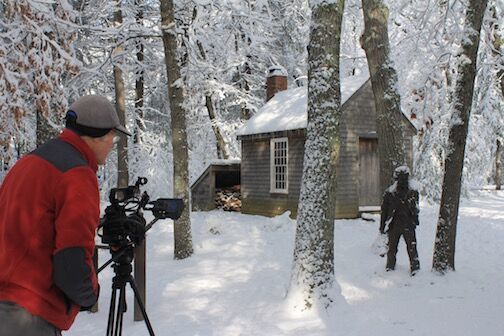
“We have to be thinking about writing and speaking to reach people who are not part of the professors,” says Notre Dame’s William P. and Hazel B. White Professor of English, Laura Walls. I spoke with her just before she traveled to Arizona to talk about Thoreau at an academic conference. And while she enjoys exchanging knowledge with others in her field, the goal of her work is to communicate with the wider public.
Rather than writing for their colleagues, the members of the Notre Dame Humanities community strive to connect with the public in a “deep way.” Walls explains the immense value in leveraging the power of words to create an informative piece while making it approachable. This is one reason she is excited for the screening of the documentary Henry David Thoreau: Surveyor of the Soul on April 12 from 7-9:30p.m. at Notre Dame’s Browning Cinema. The story of Walls’ connections to this film begins back when she was a teenager and is woven with themes integral to human life and society, regardless of the era.
When Walls’ father gave her Thoreau’s journal, her teenage years were transformed by a fascination with his endeavor to seek truth in nature, his ensuing ecological studies and his powerful articulation of these pursuits. While she had expected a career in ecology or biology, Walls headed off to the University of Washington “wanting to do what Thoreau did,” she says. Yet, she “learned the hard way that what Thoreau did isn’t what people were doing at a major university in those days.” When she switched over to English Walls found a space to study the integration of ecological appreciation with essential human awareness.
In Thoreau’s lifetime America celebrated the ideal of freedom, while keeping slaves to fuel its economy. This made Thoreau uncomfortable. He needed to think, Walls says. “If he didn’t accept it why not and what was he going to do about it?” Walden Pond became Thoreau’s refuge in which to grapple with these ideas. While there he also began to observe the natural world and became in tune with the rhythms of the plants and animals surrounding him. He began to think through an “environmental ethics,” which he spent his life deepening. Thus, a century later, Walls asserts that Thoreau was the founder of the environmental movement, while also setting an example of active thought that is applicable across issues, ranging from a consumption-driven society to the role of civil unrest.
Walls explored the connection between Thoreau and science in her first book about Thoreau, published in 1995, Seeing New Worlds: Henry David Thoreau and Nineteenth-Century Natural Science. Since then Walls has devoted her career to the field of literature and science, with a focus on transcendentalists. Her recently published biography, Henry David Thoreau: A Life was an almost-accidental product of this research. She had expected someone else would write a new comprehensive biography of Thoreau, since there hadn't been one since the 60s, and before she knew it, she was creating that book. After about nine years, the book was ready to publish in time for Thoreau’s bicentennial in 2017.
Meanwhile, filmmaker Huey was working to release a feature-length documentary during Thoreau’s bicentennial. Years earlier, while filming a documentary about Maine’s Mount Katahdin, Huey became intrigued by Thoreau, who played a small role in this tale when he climbed the mountain. Thus began “a labor of love for Huey,” Walls explains. Huey spent about close to thirteen years creating the documentary, Henry David Thoreau: Surveyor of the Soul. These years took Huey from Walden Pond to Maine, Cape Cod and elsewhere, following Thoreau’s footsteps and telling the story of his life through many voices.
Huey interviewed people from a variety of professions, regions and cultures, including Vermont high school students, Penobscot Tribal leaders, Bill McKibben and visitors who came to Walden during filming. This created “a real mosaic of voices, people from all walks of life for whom Thoreau has made a difference,” Walls says. To round out the factual details, Huey asked Walls to be the lead scholar consultant on the film. She wrote a detailed outline of Thoreau’s life to help guide the film and also shares her insight on camera. Walls’ role was particularly essential because Huey does not work from scripts.
There is also no “disembodied voice from on high,” narrating the film. Walls explains Huey’s belief that “if you hear words you should know who is speaking them.” This allows the film to explore issues such as civil disobedience, environmentalism and democracy through the opinions of interviewees. Rather than telling the audience what to think, the film conveys a myriad of worldviews and perspectives, woven together with historical fact. This actualizes the democracy that Thoreau fought for. As Walls says, “You listen; you judge for yourself.”
The film screening on April 12 from 7:00-9:30 p.m., at Notre Dame's Browning Cinema in the DeBartolo Performing Arts Center, was followed by a panel with filmmaker Huey, scholar consultant Laura Walls and English graduate student Jake McGinnis, who each brought their distinct perspective to a continued dialogue with the audience.